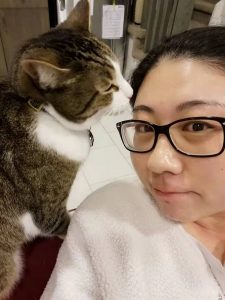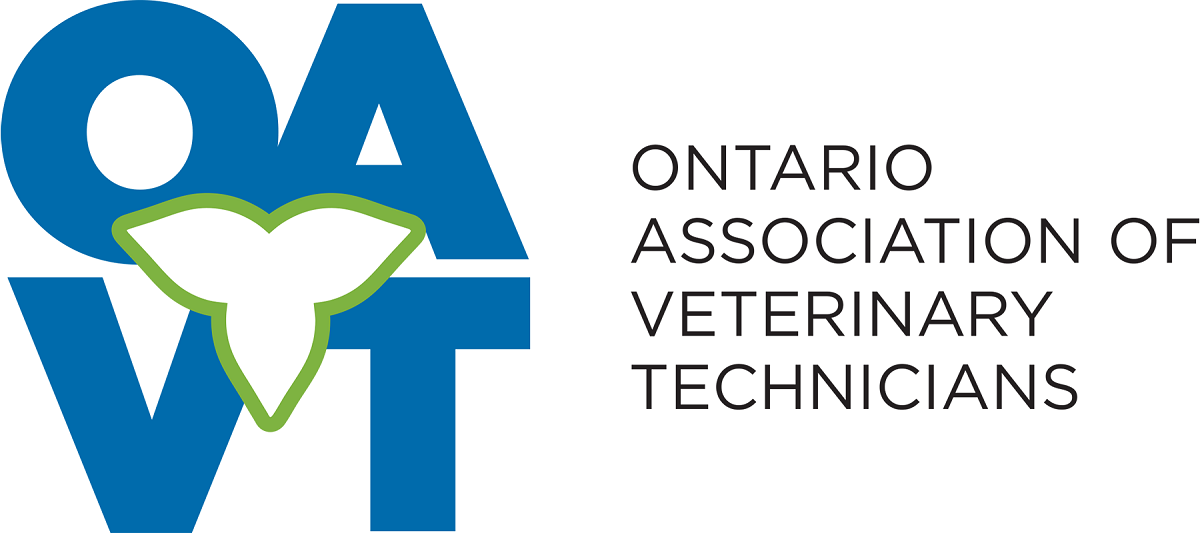Career Spotlight of the Month (February 2021)
Name: Stella (Mengxi) Zhu, RVT, BSc, MSc
Current Job: RVT, Hale Veterinary Clinic

Q & A with Stella
OAVT: Where did you go to school and what made you decide to take a Veterinary Technology program?
Stella: Growing up in China, my family never had pets. I was always so envious when I saw other people walking their dogs. In order to have the chance to interact with animals, I went to university for veterinary medicine. Working at the university’s teaching hospital during my third and fourth year made me realize how little I knew and how much I wanted to learn more. I spent a lot of time and effort learning English and came to Canada after graduation to further my studies. At the University of Guelph, I achieved my master’s degree in Animal Behaviour and Welfare with the focus on companion animals’ fear and stress in veterinary clinics. That experience made me understand why so many cats and dogs are stressed during their vet visit and what we can do to reduce their fear and anxiety. At that time, I also realized how much I craved hands-on interactions with animals in a clinic setting, so I could actually put my knowledge to use. During a conversation at school, someone told me about what RVTs do and it sounded just perfect for my personality! Supporting veterinarians to carry out diagnostic and treatment plans and providing nursing care for animals is exactly what I love to do! I enrolled in the Veterinary Technology program at University of Guelph, Ridgetown campus (shoutout to all my teachers, classmates and our colony of animals at Ridgetown!) and became an RVT shortly after graduation.
OAVT: What is your current job(s)? When did you start it? What services do you offer?
Stella: Currently I work as one of the five RVTs at Hale Veterinary Clinic in Guelph. We are a dental specialty referral practice, which offers dental and oral surgery for dogs and cats. I joined the team at the beginning of 2018 and have been really enjoying working here. Every day at work, I am with my patient throughout their whole visit. From surgery and anesthesia set-up, anesthesia monitoring, post-op medication dispensing, anesthesia recovery to discharge, I am right by their side to make sure they are safe and comfortable. As a dental specialty, we love to share information and knowledge of dentistry with our veterinary community. With Dr. Hale’s help, I select some of our typical or interesting cases and present them as case studies on our Facebook page to increase awareness of common dental diseases in dogs and cats. Recently, I have been working on analyzing our patient and treatment data from 2020. So far, I have posted the whole mouth extraction data on both dogs and cats. Stay tuned for more interesting data coming soon!
OAVT: What is your favourite part about your job?
Stella: My patients and clients are my top priorities. I have terrible teeth myself and so does my kitty Cheech, so I really understand the dental pain that my patients are experiencing and how my clients feel when they find out their furry friends have dental disease. Many of our patients suffered in silence for years before they were referred to us. In most cases, after two weeks of recovery and healing, dental surgery significantly improves their quality of life. It warms our heart every time we receive emails and letters with pictures of how great our patients are doing after their surgery. I love when our clients say that their pet is playing and eating like a puppy/kitten again! I also love when my clients notice and appreciate the little things we RVTs do for their pets such as trimming their nails, cleaning their ears or eye boogers, brushing and trimming off their matted fur, or even untwisting their harnesses.
OAVT: What is the hardest part about your job?
Stella: Just because most of our patients are treated and recover really well in a couple of weeks, it’s extra difficult for me when we see cases that we cannot help. I still remember the time we induced and were about to intubate a patient, but found a big tumor at the back of her throat. I remember another patient that came in with a big swollen face and he screamed when we tried to have a peek at what was going on; the ulceration was so profound that even if we performed surgery, there would be no healthy tissue to close the wound. And I remember the kitty with a weird mandibular growth; when we saw the colour inside, we knew it was probably a malignant melanoma. Many times, these clients and patients have already been through many treatments at their primary care veterinarians and we might be their last hope. Some of these clients are from very far away, so they have to take time off and drive to Guelph the day before their visit. It breaks my heart to see owners disappointed when we tell them that there is not much we can do to help their baby. It is so hard to accept that we cannot help every patient and cannot fix every problem presented to us.
OAVT: What other jobs have you had in the RVT field?
Stella: Before I joined my current team, I worked at a small animal general practice in Guelph for 1.5 years. It was a great experience for me to utilize what I learned from school right after graduation. Now at a referral clinic, most of the time, we only see our patient and client once, especially in cases of whole mouth extraction. I really miss the bond and connection I had with my clients and patients when I was in general practice. I loved that I knew their names the moment they walked in the door. I loved that I remembered what medication and food my patients were on when my clients called for a refill. I also loved that my patients knew me so they ran to me and wagged their tail when they saw me.

OAVT: COVID-19 has amplified stress in everyone’s lives. How has this impacted your role? And if so – what specific tools are you focusing on when helping individuals or teams through the stress of COVID-19?
Stella: We have been doing curbside only since the beginning of COVID. I used to be able to chat with clients in the exam room, hear their pet’s silly stories, go through post-op medications with them and answer their questions in person. Now with curbside, our clients drop off their pets in our vestibule and they talk to our doctors through Zoom meetings. Most of the time, I don’t even have the chance to see who our clients are. Unlike their regular veterinary team that they are familiar with before COVID, most of them do not know us at all. It must be very scary for them to drive hours to come to Guelph and drop off their baby in an unfamiliar building with unfamiliar people. It became more challenging for us to earn their trust and reassure them that we will take great care of their furry friends.
OAVT: It’s February – pet dental health month. In your experience have you had any memorable (wow moments or scary moments) when dealing with dentistry?
Stella: Since I started working my current job, I have learnt so much about dentistry! I found out a lot of things that I thought were good for my patients could actually hurt them. When I was in general practice, I thought tooth brushing, dental diets and dental chews are great for all of my patients. During dental month, I was putting together dental kits with tooth brush, samples of tooth paste and dental chews and gave them out to my clients like candies. Little did I know that these dental home care products can only be used as prevention for patients with good dental health. When disease is already established, tooth brushing or chewing on dental chews/kibbles not only can cause significant pain in our patients, but can also damage their bond with their owners. At that time, I also brushed my kitty Cheech’s teeth when he was having gingivitis – no wonder why he wanted to chew my fingers off! Even for young and ‘healthy’ pets, we see so many micro dogs and brachycephalic pets with loads of dental issues at a young age. Home dental care should not be started for any patient without a comprehensive oral health assessment and treatment by a professional.
OAVT: RVTs are passionate people, and every RVT has an area they are most passionate about (nutrition, research, spay/neuter, dog bite prevention, education, etc.). What is YOUR passion?
Stella: I want to help animals, not scare them. Making my patients less fearful during their visit is the passion of my whole career. It started when I was working at my university’s teaching hospital in China, I had been concerned about how fearful and stressed many dogs and cats were during their vet visits. I was told to pin them down or scruff cats for injections or other procedures. I knew it was wrong and wanted to do better, but I did not know how. That was the reason I focused on this research topic during my Masters program. Dr. Sophia Yin’s work was my greatest inspiration and her book, Low Stress Handling, opened up a whole new world to me. When I was in the Veterinary Technology program at Ridgetown, it became more important for me to practice those skills and use them during my interaction with our colony animals. I was really excited to find out the library at Ridgetown campus has almost all of Dr. Sophia Yin’s books and DVDs, so I used my spare time to go through all of them. I completed my Low Stress Handling Silver Certification in 2018 and also have been a Fear Free Certified Professional since 2017. Everything I have been learning about Fear Free and Low Stress Handling helps me every day during my interaction with my patients. New information is coming out every day, so it is my passion to constantly learn and improve in order to provide better care for every pet I interact with. Although Dr. Sophia Yin is not with us anymore, she will never be forgotten and her legacy remains.
Know a Spotlight RVT?
Do you know an RVT whose interesting career should be featured in our monthly RVT Career Spotlight? Email your ideas to oavt@oavt.org.
